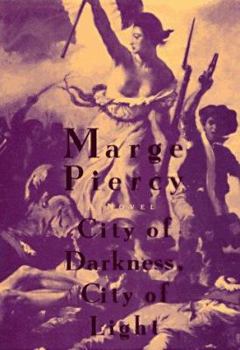City of Darkness, City of Light
Select Format
Select Condition 
Book Overview
This novel by a New York Times -bestselling author follows three "bold, courageous, and entertaining" women through the tumult of the French Revolution ( Booklist ). For Claire Lacombe and Pauline... This description may be from another edition of this product.
Format:Hardcover
Language:English
ISBN:044991268X
ISBN13:9780449912683
Release Date:October 1996
Publisher:Fawcett
Length:477 Pages
Weight:1.85 lbs.
Dimensions:9.5" x 1.4" x 6.5"
Related Subjects
Contemporary Family Saga Fiction Genre Fiction Historical Literary Literature & FictionCustomer Reviews
4 ratings
A good read needed to understand the future and the past
Published by Thriftbooks.com User , 21 years ago
This is a good read. This is good history. This is great fiction. This is the honest story of the French revolution, told from the side of masses of working people, peasants, real French people, told from the side of women and men who live as we live. This is a story of people finding searching for truth and love. This is not about disillusion with revolution, disillusion with the great moments when masses of working people take the world in their hands, this is a celebration of it, of love. This is not about the tragedy of the French revolution, but about the glory of it, and the glory of working men and above all working women. When big fights will rage to turn back the Clinton-Gore-Bush Cheeny billionaire led attacks on the standard of living of working people, their wars against people around the world, the hideous lame, stupid repulsive culture that blares out of the television and the radio monopolies, books like this will be in the hands of the young women, the young men who will lead the changes. Read this book and feel that young power, look into the past and see our future.
Shedding light on a city of darkness
Published by Thriftbooks.com User , 22 years ago
The people drove the French Revolution. From the most powerful leaders, such as Danton, to the people of the districts, like Claire Lacombe, who held their pikes, the Revolution was all about the people. Piercy - a poet, novelist, and occasional playwright - mixes what is known about this time in French history with her vivid imagination. This novel must be called fiction, but Piercy's use of real events and people makes for an interesting study of non-fiction. The work is written with the average person in mind. Still, one can not overlook Piercy's intense attention to detail and accuracy. This shows that Piercy may have been writing with the layperson in mind, but she also sought to gain scholarly readers. She took all of the facts surrounding the Revolution and filled in the gaps with logical speculation to create this masterful novel. Centered on the lives of six main characters, the novel tells the story of the French Revolution from the vantage points of these six. At times their paths cross, and the large world of France becomes smaller to the reader. Characters like Maximilien Robespierre and Manon Roland come alive and history seems to make perfect sense. The cast of real-life characters is presented in a way that no history book ever could. After reading this novel, a student of the French Revolution is better equipped to understand the finer points of the period in detail. Having a personality to attach to a name can make facts and situations easier to recall. Though the novel should not be taken as history, it is certainly a good base for future study of the French Revolution. The novel also puts a human side to this turbulent era. Cold facts cannot convey intentions, feelings, or home lives of the major and minor players of any period. Piercy's work serves to promote understanding that these men and women who live on in history were just people like those living today. Piercy's fascinating novel shows the French Revolution in a light that cannot be produced through historical texts. Her work brings the people and passion of the time to life.
The Political is Personal
Published by Thriftbooks.com User , 25 years ago
I have bought dozens of copies of this book and given them to everyone I know. It is a beautiful study of the French Revolution from a socialist feminist perspective. Piercy's growth as a writer is evident, she develops a political contextualization of the French Revolution that goes far beyond her earlier works. This book shows the process of how political movements develop and grow, and how various forces and factions affect the balance of power. This book reminded me of the flash of brilliance Piercy showed in Women on the Edge of Time and proved that the early Piercy has grown and matured. Many readers will not be able to sit through the description of political infighting and factional power plays. But for me that was the strength of the book. Piercy placed personal stories into a larger political struggle and actually brings her characters to life. One last point. When I was in Paris last summer searching for the memorial to the Paris Commune (there isn't one!) I realized how Piercy had really brought the people of Paris alive as a revolutionary movement struggling to be free. A beautiful book.
The French Revolution in 1990's-speak
Published by Thriftbooks.com User , 25 years ago
My main complaint about the book was that by superimposing our contemporary culture and idiom on the French Revolution the author detracted from the 'feel' of that period. Every time I came across an expression that is definitely contemporary, I had to grit my teeth to go on. It seems to me that the author might have taken the trouble to research the way the revolutionaries actually did express themselves.I also found that by keeping each character separated from the others, the author made it difficult to follow the narrative. In short, a disappointing book. And, I've liked her other books so much.






